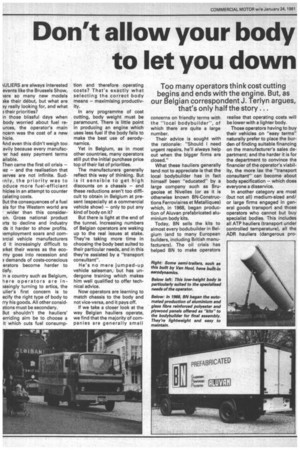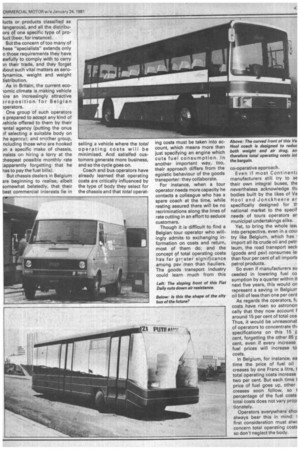Don't allow your body to let you•down
Page 48

Page 49

If you've noticed an error in this article please click here to report it so we can fix it.
Too many operators think cost cutting begins and ends with the engine. But, as our Belgian correspondent J. Terlyn argues, that's only half the story .. .
kULIERS are always interested events like the Brussels Show, .)ere so many new models ake their debut, but what are .3y really looking for, and what ?their priorities?
In those blissful days when body worried about fuel reurces, the operator's main ncern was the cost of a new hicle.
itInd even this didn't weigh too avily because every manufac.er had easy payment terms all able.
Then came the first oil crisis — ler — and the realisation that 3erves are not infinite. Sudn ly, the priority was to ocluce more fuel-efficient hides in an attempt to counter calating costs.
But the consequences of a fuel sis for the Western world are • wider than this consideron. Gross national product Irts to decline and industry ds it harder to show profits. lemployment soars and corn3rcial vehicle manufacturers d it increasingly difficult to 3rket their wares as the ecomy goes into recession and 3 demands of costs-conscious erators become harder to tisfy.
In a country such as Belgium, here operators are in3asingly turning to artics, the ulier's first concern is to ecify the right type of body to rry his goods. All other consid3tions must be secondary.
But shouldn't the hauliers' erriding aim be to choose a it which cuts fuel consump tion and therefore operating costs? That's exactly what selecting the correct body means — maximising productivity.
In any programme of cost cutting, body weight must be paramount. There is little point in producing an engine which uses less fuel if the body fails to make the best use of aerodynamics.
Yet in Belgium, as in most other countries, many operators still put the initial purchase price top of their list of priorities.
The manufacturers generally reflect this way of thinking. But is it sensible to get high discounts on a chassis — and these reductions aren't too difficult to obtain in Belgium at present (especially at a commercial vehicle show) — only to put any kind of body on it?
But there is light at the end of the tunnel. Increasing numbers of Belgian operators are waking up to the real issues at stake. They're taking more time in choosing the body best suited to their particular needs, and in this they're assisted by a "transport consultant".
He's no mere jumped-up vehicle salesman, but has undergone training which makes him well qualified to offer technical advice.
Now operators are learning to match chassis to the body and not vice-versa, and it pays off.
If we take a closer look at the way Belgian hauliers operate, we find that the majority of compa n es are generally small concerns on friendly terms with the "local bodybuilder", of which there are quite a large number.
Their advice is sought with the rationale: "Should I need urgent repairs, he'll always help out when the bigger firms are closed."
What these hauliers generally tend not to appreciate is that the local bodybuilder has in fact himself been "educated" by a large company such as Brugeoise et Nivelles (or as it is otherwise known BN-Constructions Ferroviaires et Metalliques) which, in 1968, began production of Aluvan prefabricated aluminium body kits.
Today, BN sells the kits to almost every bodubuilder in Belgium (and to many European builders, including British manufacturers). The oil crisis has helped BN to make operators realise that operating costs will be lower with a lighter body.
Those operators having to buy their vehicles on "easy terms" naturally prefer to place the burden of finding suitable financing on the manufacturer's sales department; and the harder it is for the department to convince the financier of the operator's viability, the more lax the "transport consultant" can become about body specification — which does everyone a disservice.
In another category are most (but not all) medium-sized and/ or large firms engaged in general goods transport and those operators who cannot but buy specialist bodies. This includes all ATP hauliers (transport under controlled temperature), all the ADR hauliers (dangerous pro lucts or products classified as langerous), and all the distribuors of one specific type of proluct (beer, for instance).
But the concern of too many of hese "specialists" extends only o those requirements they have awfully to comply with to carry )n their trade, and they forget ibout such vital matters as aerolynamics, weight and weight listribution.
As in Britain, the current ecolomic climate is making vehicle lire an increasingly attractive )roposition for Belgian )perators.
One group of such operators s prepared to accept any kind of rehicle offered to them by their -ental agency (putting the onus 3f selecting a suitable body on :he agency); and 3 nother group, ncluding those who are hooked an a specific make of chassis, nsists on hiring a lorry at the .3heapest possible monthly rate Iapparently forgetting that he has to pay the fuel bills).
But chassis dealers in Belgium are beginning to realise, albeit somewhat belatedly, that their best commercial interests lie in selling a vehicle where the total operating costs will be minimised. And satisifed customers generate more business, and so the cycle goes on.
Coach and bus operators have already learned that operating costs are critically influenced by the type of body they seiect for the chassis and that total operat
ing costs must be taken into account, which means more than just specifying an engine which cuts fuel consumption. In another important way, too, their approach differs from the egoistic behaviour of the goods transporter: they collaborate.
For instance, when a tour operator needs more capacity he contacts a colleague who has a spare coach at the time, while resting assured there will be no recriminations along the lines of rate cutting in an effort to seduce customers.
Though it is difficult to find a Belgian tour operator who willingly admits to exchanging information on costs and return, most of them do; and the concept of total operating costs has far grrater significance among psv men than hauliers. The goods transport industry could learn much from this co-operative approach.
Even if most Continentz manufacturers still try to se their own integral buses, the nevertheless acknowledge thi bodies built by the likes of Va hlool and Jonckheere ar specifically designed for th national market to the specif needs of tours operators ar municipal undertakings alike.
Yet, to bring the whole isst. into perspective, even in a cow try like Belgium, which has 1 import all its crude oil and petr leum, the road transport sect' (goods and psv) consumes le: than four per cent of all importt petrol products.
So even if manufacturers su ceeded in lowering fuel co sumption by a quarter within ti next five years, this would on represent a saving in Belgiurr oil bill of less than one per cent As regards the operators, fu costs have risen so astronon cally that they now account f around 15 per cent of total cos: Thus, it would be unreasonat of operators to concentrate thi specifications on this 15 p cent, forgetting the other 85 p cent, even if every increase fuel prices will increase to costs.
In Belgium, for instance, ea time the price of fuel oil creases by one Franc a litre, t total operating costs increase two per cent. But each time t price of fuel goes up, other creases soon follow, so t percentage of the fuel costs total costs does not vary prop tionately.
Operators everywhere shoi always bear this in mind: 1 first consideration must aim concern total operating costs so don't neglect the body.








































































































